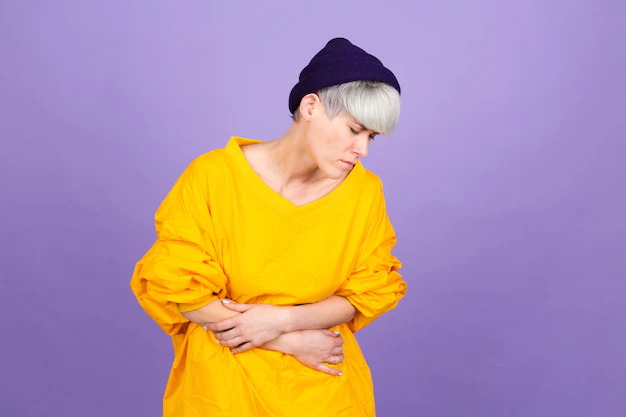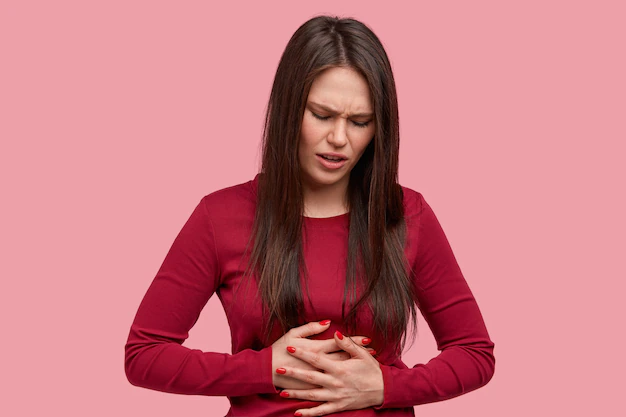
Stomach pain when hungry is a normal occurrence, yet it should be best avoided. Presently, the prevalence of gastrointestinal diseases is increasing due to urban lifestyles. Working adults are at the highest risk of developing stomach disease. Stomach pain when hungry appears typical enough to be considered harmless. However, it can also be a sign of more serious gastric diseases.
Why Do I Have Stomach Pain When Hungry?
Have you ever heard of the term “Hunger pangs”? Hunger pangs (aka stomach pain when hungry) are symptoms when you experience a gnawing sensation in the stomach when it is empty. The pain is sometimes in the epigastric region, generally called “upper stomach pain when hungry”. Hunger pangs are caused by the clenching of stomach muscles when there is no content in the stomach. The uncomfortable sensation is usually accompanied by a desire to eat, and it often leads to hunger pangs.
Despite the general occurrence of hunger pangs, the sensations can indicate more serious stomach diseases. Each person feels hunger pangs differently, so getting to know and understand your body is a basic suggestion. However, it is important that hunger pangs with other symptoms such as nausea or blood vomiting are not better left untreated, for they can indicate other diseases as well.
What Can Stomach Pain When Hungry Leads to?

Stomach pain when hungry seems harmless enough to be generally ignored, but in truth, it can lead to something far more serious. In case of hunger pangs with cramping or bloating feelings, they may indicate other gastric diseases. The most common disease caused by unattended hunger pangs is Gastritis. Even though gastrointestinal diseases are usually caused by complex mechanisms, they can be divided into 2 main categories as follows:
Gastritis Without Ulcer
Gastric without ulcers is multifactorial. Eating habits are usually considered to be the primary cause of the disease. A regular habit of drinking alcohol and caffeinated beverages, eating spicy, sour, and high-fat foods contributes to the occurrence of gastric ulcers. Smoking, stress, and sleep deprivation are considered important factors as well. These factors irritate the stomach and cause inflammation, which can eventually lead to gastric ulcers and duodenal ulcers.
Stomach Ulcer
Usually, this type of ulcer may cause upper stomach pain when hungry. Stomach ulcers are generally caused by two main reasons. The first cause is regular use of anti-inflammatory drugs such as diclofenac, ibuprofen, proxen etc. The second reason is a bacterial infection of H. pylori. The mechanism of this infection begins with the production of alkaline substances by H. pylori. The substances dilute the acids in the stomach, making it easier for bacteria to damage the epithelial cells by releasing toxins. This results in chronic inflammation of the gastric mucosa, the lining layer of the stomach, and leads to stomach ulcers. In some severe cases, the inflammation can develop into gastric cancer.
Stomach Pain When Hungry Causes

Knowing the causes of stomach pain when hungry is important. Despite the factors contributing to hunger pangs and gastritis, many of them are adjustable and preventable. Here are some examples of the hunger pangs’ causes:
- Dehydration. Hunger and thirst can be similar, and it might be difficult for some people to differentiate between the two. Thirst can cause stomach pain, shaking, and lightheadedness, which are similar to hypoglycemia symptoms. It can cause hunger pangs as well.
- Sleep deprivation. Lack of sleep results in a need to eat sweet, salty, and high-fat foods.
- Stress. Stress can trick the brain to think that the body is hungry. Hence, hunger pangs occur because of emotional hunger by the influence of negative emotions.
- Hunger hormone. Ghrelin responses to an empty stomach for it releases stomach acids to digest the foods. However, if food is not consumed, the stomach acid attacks the lining wall of the stomach instead, resulting in stomach pain when hungry.
- Medication. Some medication such as antidepressants can cause hunger pangs. Consult the doctor for suitable medications.
Gastritis And Stomach Pain When Hungry
Despite the fact that stomach pain when hungry can occur due to gastritis, there are other stomach diseases to consider. What is it that I’m experiencing? Is it just a normal hunger pang, gastritis, or other gastric diseases? What are the symptoms of other gastric diseases? You might wonder what the answer is to those questions, and to determine which one is the right one, let’s learn more about gastritis first.
What is Gastritis
The term “gastritis,” which refers to an inflammation of the stomach lining, is considered common and curable. The inflammation is mostly the result of bacterial infection or a regular usage of NSAIDs. It is also important to take into account prerequisite elements like consuming alcohol, smoking, and eating spicy cuisine.
Gastritis can be categorized into 2 groups: acute gastritis and chronic gastritis. In most cases, gastritis is not serious and improves quickly with treatment. However, in some severe cases, the condition can lead to other serious diseases, such as stomach cancer.
Gastritis Treatment
How to treat Gastritis?
Gastritis is mostly caused by an accumulation of bad habits over time. Lifestyle adjustments are recommended to both treat the condition and prevent its recurrence. Making a habit of punctual eating is helpful, as is avoiding spicy, sour, and high-fat foods. Avoiding drinking alcohol and smoking also helps.
Gastritis can be treated with medications. The most common medications for the disease are 1) antacids and 2) stimulating gastric compression medications. However, in the case of stomach ulcers, it is recommended to seek professional advice in order to precisely prescribe medications suitable for each person.
The doctor might suggest that some people with stomach ulcers take antacids continuously for 6–8 weeks to heal the wounds. The stomach wound can also be checked by gastrointestinal endoscopy.
Gastritis is treatable and mostly harmless, but it can lead to far more serious diseases such as gastric bleeding or gastric cancer. Because stomach diseases are usually chronic, changing one’s lifestyle is generally advised once the wound has healed. Prevention is the best option for treating gastric diseases.
Gastritis Prevention
Here are some factors contributing to gastritis:
- Bacterial infection. H. pylori is transmitted through food. Washing hands before having a meal is recommended, as same as eating healthy and clean foods.
- Excessive alcohol use. Drinking alcohol irritates and damages the stomach lining, making it more vulnerable to bacterial infection. Drinking less alcohol helps.
- Stress. Stress causes immunity to drop and the body will be prone to get infected easier. Try to be stress-free and get enough rest.
- A regular usage of painkillers. NSAIDs can cause inflammation in the stomach, resulting in gastritis. Take medications when in need is suggested.
- Changing eating habits. Making a habit of eating punctually and keeping the routine helps. The same goes to eating less spicy or sour foods.
Stomach Pain When Hungry Conclusion
Stomach pain when hungry is a typical occurrence, which is also known as hunger pangs. Hunger pangs can indicate many things, from normal hunger to gastric diseases. Gastritis usually causes hunger pangs, but it is not recommended to self-diagnose. Gastric diseases are varied and have different symptoms, even though they share the gnawing sensation of hunger pangs. It is recommended to seek professional advice to precisely diagnose and treat the condition.
